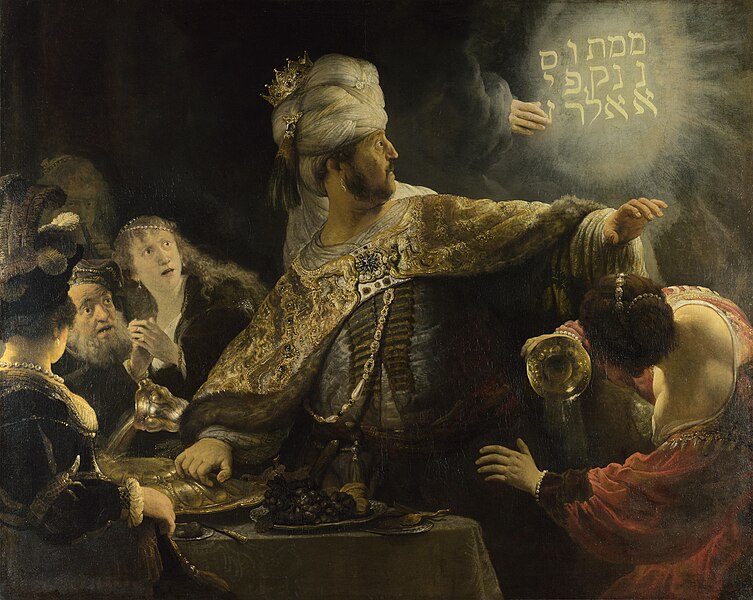Now there was a day when his sons and daughters were eating and drinking wine in their oldest brother’s house;
And a messenger came to Job and said, “The oxen were plowing and the donkeys feeding beside them,
When the Sabeans raided them and took them away—indeed they have killed the servants with the edge of the sword; and I alone have escaped to tell you!”
While he was still speaking, another also came and said, “The fire of God fell from heaven and burned up the sheep and the servants, and consumed them; and I alone have escaped to tell you!”
While he was still speaking, another also came and said, “The Chaldeans formed three bands, raided the camels and took them away, yes, and killed the servants with the edge of the sword; and I alone have escaped to tell you!”
While he was still speaking, another also came and said, “Your sons and daughters were eating and drinking wine in their oldest brother’s house,
And suddenly a great wind came from across the wilderness and struck the four corners of the house, and it fell on the young people, and they are dead; and I alone have escaped to tell you!”
Then Job arose, tore his robe, and shaved his head; and he fell to the ground and worshiped.
And he said:
“Naked I came from my mother’s womb,
And naked shall I return there.
The Lord gave, and the Lord has taken away;
Blessed be the name of the Lord.”
In all this Job did not sin nor charge God with wrong.
There is not one but four different messangers in Job who "alone" escape to tell the tale. Ishmael is identified with all those survivors of all those tragedies. Meanwhile, we are left to ask, well, who is Job? If we draw out the analogy, as Melville baits us to do, the White Whale is either one or all of these divine misfortunes, Ahab and the crew are the slaughtered children and servants of Job, and Job, of course, is the person to whom Ishmael brings his message. That is, you, dear reader, are Job.
Now, we may be overplaying that quote, but, Moby-Dick gives us fertile ground for flights of readerly imagination. In the some fifty or so blog posts that have gone up since the beginning of December, I have focused in on a few major themes of Moby-Dick, particularly the allusions to mythology and non-Western religions, Melville's "epistemology" and the questioning of our ability to know or perceive, his approach to reading, and his dramatic technique.
As we close, I remind you how few aspects of this book I have touched on. Here are some of the threads in the book I would love to explore further:
Melville's argument with the Christian God; this book relies heavily on references to the fast-fish-and-loose-fish chapters of the Bible, chapters like Job and Jonah dealing with power and obedience. I have genuflected at some of these discussions, but they run far deeper than this blog would suggest.
Melville's commentary on contemporary politics, and especially his depiction of the crews of the various boats who visit with the Pequod: I have devoted not a single post to these visits, yet, they are one of the central threads on the loom.
Melville's parrying with various philosophers (beyond epistemological thrusts), and particularly his ongoing discussions with Locke (who was accepted in America, in spirit, as a sort of virtual founding father), Hume, Hobbes, the Germans, and, particularly, the locally ever-looming Emerson. No small part of this book is a dialogue with the transcendentalists, the inescapable intellectual groundlings of New England.
The book's musicology. If you open a dozen pages, expect to see musical references on nearly half. The harps sing; there is a symphony before the chase; music appears at the very heart of the book. This is not random.
The symbolism. I acknowledged the Great Loom, and I mentioned Queequegs accoutrements, but for many of the early revivalists to read Moby-Dick was to divine symbols and their meaning. Every wave spoke, and the symbols would, should, ought to build into allegories bearing masonic meanings. I find Melville more of a literalist, willing to tell us just what he means. But, still, there are still symbols here, and great ones, ones that will give a laugh as well as a moment of recognition. More can be done with them; uncovering the phallic symbols alone is worth a read.
Job-like, we have only begun to imagine what challenges Melville, with his foot on the Treadle of the Press, has set for us in this book. Is this reading, or perhaps even this book, but the first appearance of the Ishmaelian messanger? Or is he, simultaneously, telling us all four tales?


